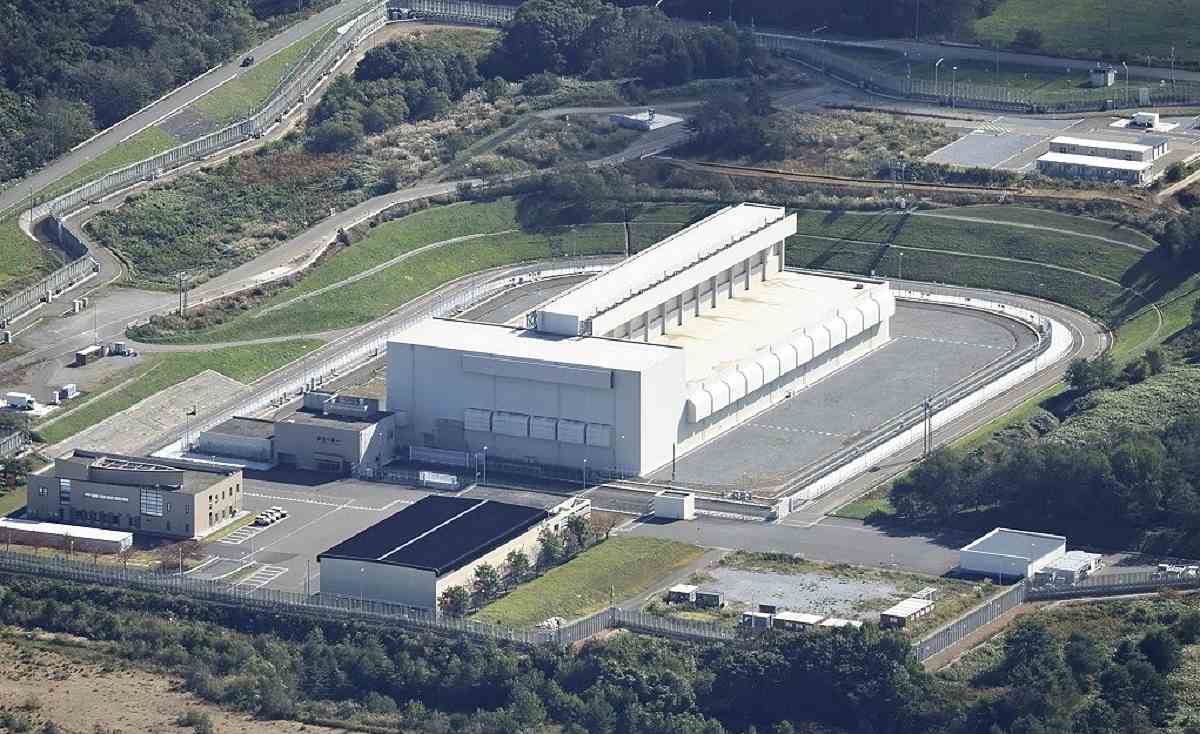Spent N-fuel Storage Facility Begins Operation; Tons Of Fuel To Be Stored in Aomori Up To 50 Years

An interim facility to store nuclear spent fuel in Mutsu, Aomori Prefecture
21:00 JST, November 6, 2024
The nation’s first interim facility to temporarily store spent nuclear fuel in Mutsu, Aomori Prefecture, began official operations on Wednesday as the Nuclear Regulation Authority decided to issue a certificate confirming the completion of pre-operation inspections that morning.
By reducing the amount of spent nuclear fuel stored at places such as the Kashiwazaki-Kariwa nuclear power plant’s Nos. 6 and 7 reactors in Niigata Prefecture, which Tokyo Electric Power Company Holdings, Inc. is aiming to reactivate, TEPCO and other electricity companies expect to achieve stable operation of their nuclear power plants.
On Sept. 26, the facility received its first shipment of 12 tons of fuel in a cask from the Kashiwazaki-Kariwa nuclear power plant. It is scheduled to receive a total of 96 tons of spent nuclear fuel by fiscal 2026. In the future, the facility’s two buildings will store a maximum of 5,000 tons of fuel for up to 50 years.
At a regular meeting on Wednesday, the NRA received a report from its secretariat that safety management measures at the Mutsu facility are being implemented appropriately. Five NRA members unanimously decided to issue a certificate that confirms the completion of pre-use inspections to the Recyclable-Fuel Storage Co. (RFS) — the facility’s operating company in which TEPCO and the Japan Atomic Power Co. each have a stake. RFS received the certificate in the afternoon on Wednesday and started operations at the facility.
The government has a nuclear fuel cycle policy in which spent nuclear fuel is reprocessed to create uranium-plutonium mixed oxide (MOX) fuel, which is then reused in nuclear power plants. However, neither a reprocessing plant in the village of Rokkasho, Aomori Prefecture, nor an MOX fuel plant also in the village are yet complete, and all of Japan’s nuclear power plants currently have no other choice but to store spent nuclear fuel on-site.
According to the Federation of Electric Power Companies of Japan, spent nuclear fuel stored at nuclear power plants across the country reached nearly 80% of storage capacity of about 20,000 tons. For the government, which aims to ensure the stable operation of nuclear power plants, securing an interim storage facility is a pressing issue, and it is also essential for establishing a nuclear fuel cycle.
Top Articles in Business
-

Prudential Life Insurance Plans to Fully Compensate for Damages Caused by Fraudulent Actions Without Waiting for Third-Party Committee Review
-

Narita Airport, Startup in Japan Demonstrate Machine to Compress Clothes for Tourists to Prevent People from Abandoning Suitcases
-

Japan, U.S. Name 3 Inaugural Investment Projects; Reached Agreement After Considerable Difficulty
-

Toyota Motor Group Firm to Sell Clean Energy Greenhouses for Strawberries
-

SoftBank Launches AI Service for Call Centers That Converts Harsh Customer Voices into Softer Voices
JN ACCESS RANKING
-

Japan PM Takaichi’s Cabinet Resigns en Masse
-

Japan Institute to Use Domestic Commercial Optical Lattice Clock to Set Japan Standard Time
-

Israeli Ambassador to Japan Speaks about Japan’s Role in the Reconstruction of Gaza
-

Man Infected with Measles Reportedly Dined at Restaurant in Tokyo Station
-

Videos Plagiarized, Reposted with False Subtitles Claiming ‘Ryukyu Belongs to China’; Anti-China False Information Also Posted in Japan




















